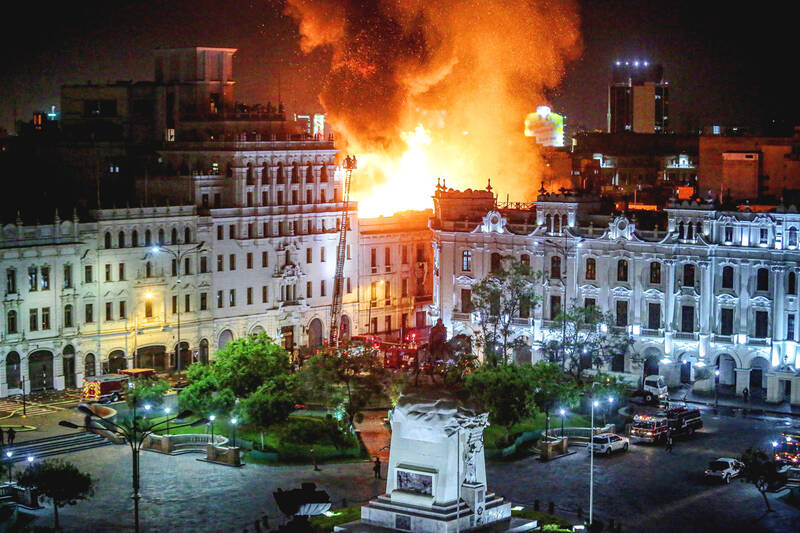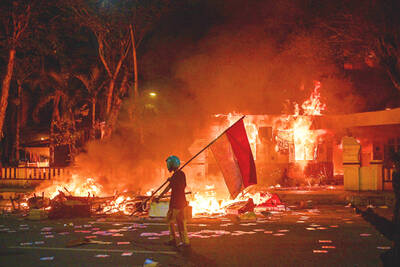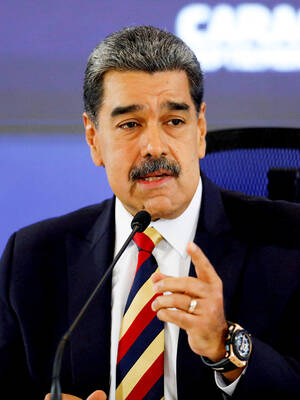Thousands of protesters poured into Lima on Thursday, clashing with police amid tear gas and smoke, and demanding the ouster of Peruvian President Dina Boluarte as they say the country is at a “breaking point.”
Many came from remote Andean regions, where 55 people have died amid unrest since Peru’s first president from a rural Andean background was removed from office last month.
The protests have seen Peru’s worst political violence in more than two decades and highlighted deep divisions between the country’s urban elite, largely concentrated in Lima, and poor rural areas. Former Peruvian president Eduardo Castillo has been in detention and expected to be tried for rebellion since he was impeached after a failed attempt to dissolve the Peruvian Congress.

Photo: EPA-EFE
The day was mostly quiet, punctuated by clashes and tear gas.
The Peruvian government called on everyone who could to work from home.
At night, clashes escalated and a major fire broke out at a building near the historic Plaza San Martin, although no connection to the protests was immediately clear.
Anger at Boluarte was the common thread as protesters chanted calls for her resignation and street sellers hawked T-shirts saying: “Out, Dina Boluarte,” “Dina murderer, Peru repudiates you” and “New elections, let them all leave.”
Peruvian Acting Ombudsman Eliana Revollar said at least 13 civilians and four police officers were injured in the Lima protests during the day.
A total of 22 police officers and 16 civilians were injured throughout the country, Peruvian Minister of the Interior Vicente Romero Fernandez said.
Protesters blamed Boluarte for the violence.
“Our God says thou shalt not kill your neighbor. Dina Boluarte is killing, she’s making brothers fight,” Paulina Consac said as she carried a large Bible while marching in downtown Lima with more than 2,000 protesters from Cusco.
Many Lima residents also joined the protests, with strong presences from students and union members.
“We’re at a breaking point between dictatorship and democracy,” said Pedro Mamani, a student at the National University of San Marcos, where demonstrators who traveled for the protest were being housed.
The university was surrounded by police officers, who also deployed at key points of Lima’s historic downtown district — 11,800 officers in all, according to Lima Police Force Chief Victor Zanabria.
Boluarte was defiant on Thursday night in a televised speech alongside key government officials in which she thanked police for controlling the “violent protests” and vowed to prosecute those responsible for violence.
Boluarte has said she supports a plan to hold presidential and legislative elections next year, two years before originally scheduled.
The president also criticized the protesters for “not having any kind of social agenda that the country needs,” accused them of “wanting to break the rule of law” and raised questions about their financing.
For much of the day, the protests played out as a cat-and-mouse game, with demonstrators, some of whom threw rocks at law enforcement, trying to get through police lines and officers responding with volleys of tear gas that sent protesters fleeing, using rags dipped in vinegar to alleviate the sting to their eyes and skin.
“We’re surrounded,” Sofia Lopez, 42, said as she sat on a bench outside the Peruvian Supreme Court. “We’ve tried going through numerous places and we end up going around in circles.”
Lopez traveled to Lima from Carabayllo, about 35km north of the capital.
By early afternoon, protests had turned key roads into large pedestrian areas in downtown Lima.
There was visible frustration among the protesters, who had hoped to march to Miraflores District, an emblematic neighborhood of the economic elite 8km from downtown.
In a Miraflores park, a large police presence separated anti-government protesters from a small group of demonstrators expressing support for law enforcement. Police fired tear gas there as well to disperse demonstrators.
By bringing the protest to Lima, demonstrators hoped to give fresh weight to the movement that began when Boluarte was sworn into office on Dec. 7 to replace Castillo.
“When there are tragedies, bloodbaths outside the capital it doesn’t have the same political relevance in the public agenda than if it took place in the capital,” said Alonso Cardenas, a public policy professor at Antonio Ruiz de Montoya University in Lima.

‘NEO-NAZIS’: A minister described the rally as ‘spreading hate’ and ‘dividing our communities,’ adding that it had been organized and promoted by far-right groups Thousands of Australians joined anti-immigration rallies across the country yesterday that the center-left government condemned, saying they sought to spread hate and were linked to neo-Nazis. “March for Australia” rallies against immigration were held in Sydney, and other state capitals and regional centers, according to the group’s Web site. “Mass migration has torn at the bonds that held our communities together,” the Web site said. The group posted on X on Saturday that the rallies aimed to do “what the mainstream politicians never have the courage to do: demand an end to mass immigration.” The group also said it was concerned about culture,

CRACKDOWN: The Indonesian president vowed to clamp down on ‘treason and terrorism,’ while acceding to some protest demands to revoke lawmaker benefits Protests in Indonesia over rising living costs and inequality intensified overnight, prompting Indonesian President Prabowo Subianto to cancel a planned trip to China, while demonstrators reportedly targeted the homes of the finance minister and several lawmakers. Rioters entered Indonesian Minister of Finance Sri Mulyani Indrawati’s residence near Jakarta early yesterday, but were repelled by armed forces personnel, Kompas reported. Items were taken from the homes of lawmaker Ahmad Sahroni and two others, according to Detik.com. The reports of looting could not be independently verified, and the finance ministry has not responded to requests for comment. The protests were sparked by outrage over

VENEZUELAN ACTION: Marco Rubio said that previous US interdiction efforts have not stemmed the flow of illicit drugs into the US and that ‘blowing them up’ would US President Donald Trump on Wednesday justified a lethal military strike that his administration said was carried out a day earlier against a Venezuelan gang as a necessary effort by the US to send a message to Latin American cartels. Asked why the military did not instead interdict the vessel and capture those on board, Trump said that the operation would cause drug smugglers to think twice about trying to move drugs into the US. “There was massive amounts of drugs coming into our country to kill a lot of people and everybody fully understands that,” Trump said while hosting Polish President

A French couple kept Louise, a playful black panther, in an apartment in northern France, triggering panic when she was spotted roaming nearby rooftops. The pair were were handed suspended jail sentences on Thursday for illegally keeping a wild animal, despite protesting that they saw Louise as their baby. The ruling follows a September 2019 incident when the months-old feline was seen roaming a rooftop in Armentieres after slipping out of the couple’s window. Authorities captured the panther by sedating her with anesthetic darts after she entered a home. No injuries were reported during the animal’s time on the loose. The court in the